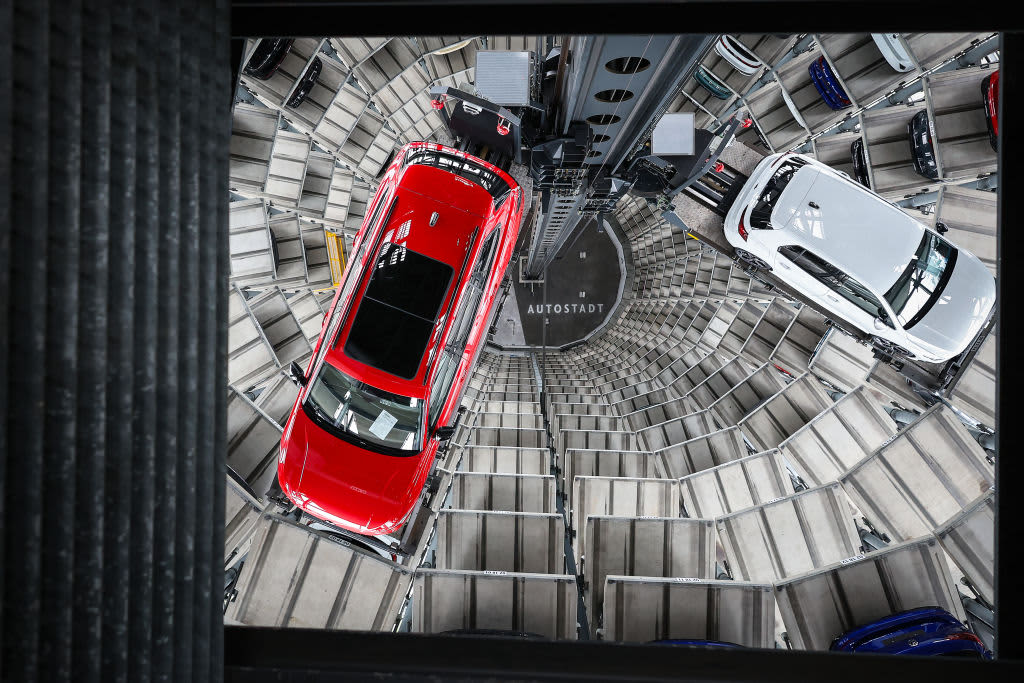Germany’s economy minister and auto industry lambasted U.S. President Donald Trump’s plans to impose sweeping 25% tariffs on U.S. car imports, saying the move sends a “fatal signal” to free and rules-based trade.
Trump on Wednesday said he would implement tariffs on all vehicles and foreign-made auto parts imported into the U.S., as part of measures set to come into force from April 2.
The duties, which coincide with an even broader push on levies starting next week, represent a major escalation in an already brewing global trade war.
German Economy Minister Robert Habeck called for the European Union to provide a “decisive response” to Trump’s latest tariff announcement, saying the levies “ultimately harm the US and the EU, and global trade as a whole.”
“The announcement of high tariffs on cars and car parts is bad news for German carmakers, for the German economy, for the EU, but also for the US,” Habeck said Thursday in a Google-translated statement.
“It is now crucial that the EU delivers a decisive response to the tariffs – it must be clear that we will not back down in the face of the US . Strength and self-confidence are required,” he added.
European auto stocks traded sharply lower on Thursday, tracking auto losses in Asia overnight.
French car parts supplier Valeo provisionally closed 7.7% lower, while Milan-listed StellantisPorsche
“The announced additional US tariffs of 25% on all passenger cars and light commercial vehicles not manufactured in the US send a fatal signal for free, rules-based trade,” Hildegard Müller, president of the German Association of the Automotive Industry (VDA), said in a statement out Wednesday.
“The tariffs, which are scheduled to take effect on April 2, will place a significant burden on both companies and the automotive industry’s closely interwoven global supply chains—with negative consequences, especially for consumers—including in North America,” Müller said.
The VDA’s Müller underlined the economic importance of free and fair trade to both sides of the transatlantic partnership and called for immediate negotiations between the U.S. and EU on a bilateral agreement.
“The risk of a global trade conflict – with negative impacts on the global economy and growth, prosperity, jobs, and consumer prices – is high on all sides,” Müller said.
‘Unjustified’
Analysts have previously warned Germany’s auto sector appears to be significantly exposed to U.S. tariffs, noting that the country was — by some distance — Europe’s largest exporter of passenger cars to the U.S. in 2023.
Germany’s VolkswagenMercedes-Benz GroupBMW have all issued profit warnings in recent months, citing economic weakness and sluggish demand in China, the world’s largest car market.
Miguel Berger, German ambassador to the U.K., said tariffs on automotive imports to the U.S. were “unjustified” and an attempt to reorganize international trade “to the sole advantage of investments in the U.S.”
“Tariffs will do huge damage to industry and consumers. We need to engage in talks & be ready for a strong, united response,” Berger said Thursday on the X social media platform.
The European Automobile Manufacturers’ Association (ACEA) said it was “deeply concerned” by Trump’s proposed auto tariffs. The ACEA, a car lobby group, represents the likes of BMW, FerrariRenaultVolkswagen and Volvo.
“The EU and the US must engage in dialogue to find an immediate resolution to avert tariffs and the damaging consequences of a trade war,” ACEA Director General Sigrid de Vries said in a statement.
How have automakers responded?
A spokesperson at BMW said it remains committed to reducing tariffs and trade barriers between the EU and U.S., warning that a trade conflict between these economic regions “would not have any benefits.”
BMW said its plant in Spartanburg, South Carolina is its biggest plant worldwide and has served as an important location for the firm’s production network for more than 30 years.
In 2024, the company said the plant exported roughly 225,000 BMW vehicles with an export value of more than $10 billion, “making it once again the largest automotive exporter by value” in the U.S.
A spokesperson at Mercedes-Benz Group said the company, which directly employs about 11,100 people in the U.S., was currently assessing the impact of Trump’s proposed autos tariffs.
“As a global company, we rely on constructive cooperation and policies that promote mutually beneficial trade across international markets,” a spokesperson told CNBC via email.
Sweden’s Volvo Cars said on Thursday that it was “looking into the effects of the changes in tariffs” as announced by the Trump administration.
“Volvo Cars follows the developments in different markets including the US. We follow government rules and pay all required duties on all imported vehicles and on all parts as required by law,” a Volvo Cars spokesperson told CNBC over email.
“It’s too soon to comment further at this stage,” they added.
French carmaker Renault, which is not present in the U.S. market, said it remains attentive to tariff developments.
Renault-owned premium sportscar brand Alpine has previously announced it is looking to expand its global footprint, with the U.S. as one of the markets under consideration.
“Alpine is keeping a close eye on the local situation in order to be able to assess the possibilities and conditions for entering this territory,” a Renault spokesperson said.
International: Top News And Analysis
Read the full article <a href="Read More” target=”_blank”>here.



